Why Your Tortie Cat Bites You?
Tortoiseshell cats, or tortie cats, have unique coat patterns with a mix of black, orange, and brown markings in striking patterns, including brindled and patchwork designs. While they can be playful and affectionate, some tortie cats may exhibit biting behavior towards their owners.
But why do they do it? Why does my tortie cat bite me?
Well, as you know, Tortoiseshell cats are not a specific breed but rather a coat pattern that can be found in various breeds of cats. Their unique pattern comes from genetic mutations. Therefore, genetic influence can be responsible for biting or aggressive behavior in them. Besides that, a Tortie cat can bite you for the same reasons as the other cats, such as fear, anxiety, stress, dominance, communication, frustration, Survival instincts, love bites, distinct personality, and temperament.
That’s just the tip of the iceberg; in this blog post, we’ll explore all the possible reasons why your tortie cat may be biting you in detail and provide some tips on how to prevent it from happening in the future.
Interested in similar topics on cats:
Are Tortoiseshell Cats Bad-Tempered or Aggressive or Difficult?
Interstingly, most of the tortie cats are female. It’s rare to find a male tortie. According to some sources, about 1 out of 3000 can be male.
The unique and beautiful coloring of tortoiseshell cats makes them a favorite among many cat lovers. And as mentioned, biting, aggressive, or difficult behavior does not acquaint with tortie cats.
However, these cats are often described as having a distinct personality, commonly referred to as “tortitude.”
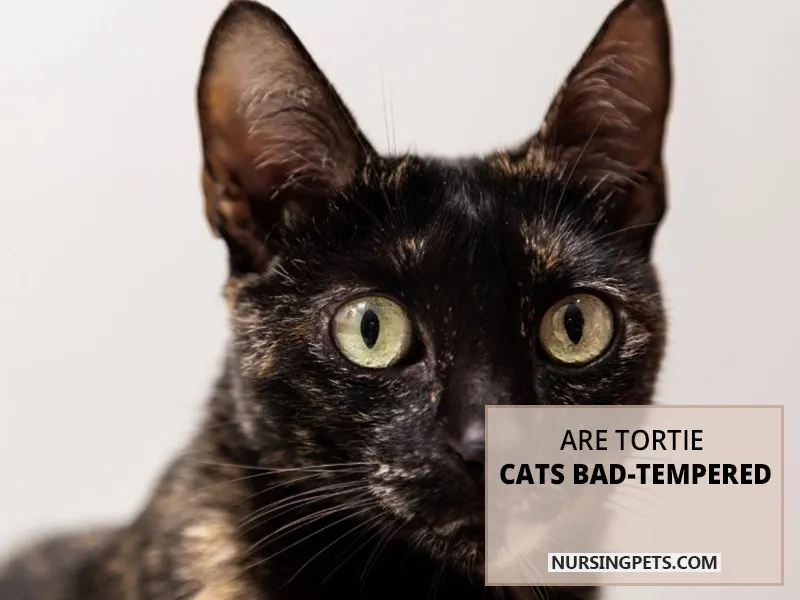
Researchers at the UC Davis Veterinary Medical Teaching Hospital examined whether a domestic cat’s coat color affected its behavior in a study they conducted. The study primarily focused on tortoiseshell cats, calicos, and “torbies.”
In the survey, the participants responded that- female and orange-colored cats (tortoiseshells, calicos, and “torbies”), black-and-white, and gray-and-white are more likely to be aggressive toward humans in certain situations. (source)
But the study concluded that they did not find any specific relation between coat color and behavior, personality, or temperament.
While some sources suggest they may have a strong-willed or independent nature, individual personalities can vary greatly. And not all torties exhibit aggressive or difficult behaviors.
However, It’s better to approach cautiously and consider factors such as genetics, upbringing, and experiences. And proper socialization and care can help foster a positive relationship.
Reasons Why Your Tortieshell Cat Bites You
Having a Tortoiseshell cat can be a delightful experience, but their biting behavior can become problematic. So, understanding the reasons behind their biting can help improve your relationship with them. Here are seven common reasons why your Tortoiseshell cat may bite you.
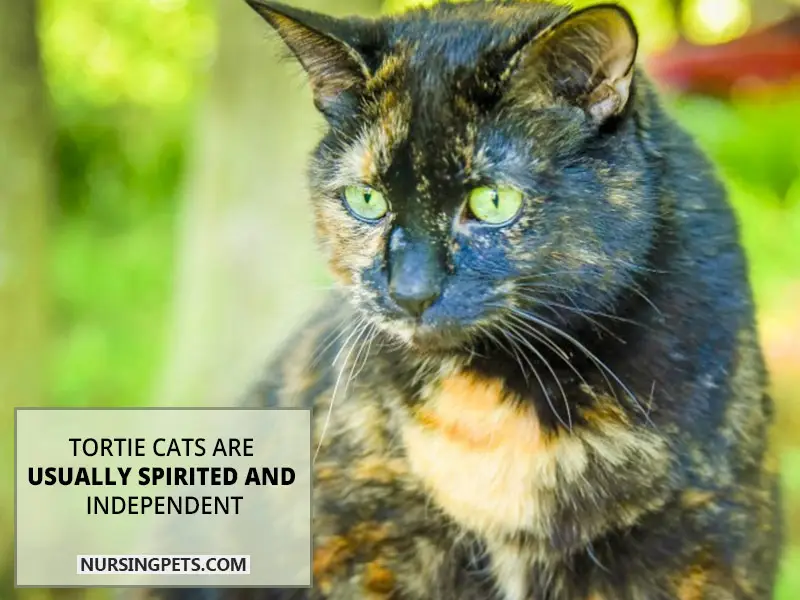
01. Genetics, Personality, and Training
As we mentioned previously, Tortoiseshell cats’ genetics or roots can impact their behavior. Also, their spirited and independent nature and unique personality traits can influence their individual behavior.
And their unique personality traits can influence their tendency to bite. Proper training, using positive reinforcement techniques, can help redirect their behavior and establish a stronger bond between you and your feline friend.
02. Communication/ Attention-Seeking Behavior
Cats often use biting as a form of communication. They may bite you to get your attention, expressing their desire for playtime, food, or affection. Paying attention to their needs and providing appropriate interaction to avoid bites is important.
03. Playfulness/Love Bites/ Territoriality/ Overstimulation
Tortoiseshells are playful creatures and may engage in biting during play sessions. Love bites, where they gently nibble on you, can be a sign of affection.
Furthermore, they may bite when they feel their territory is being invaded or if they become overstimulated during petting sessions.
04. Fear, Anxiety, and Boredom (Previous Trauma or Abuse)
Cats that have experienced trauma or abuse in the past may resort to biting as a defense mechanism when they feel threatened. Fear, anxiety, or boredom can also trigger biting behavior.
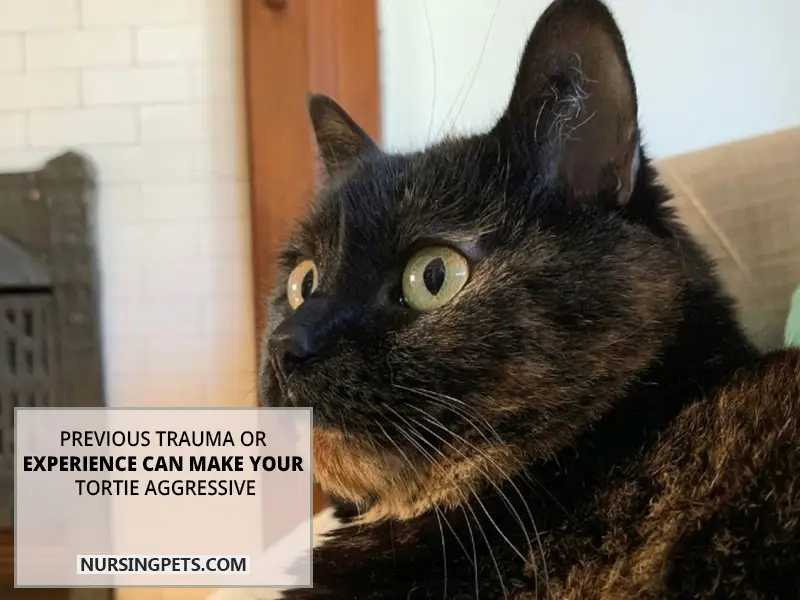
Creating a safe and stimulating environment can help alleviate these issues and reduce biting incidents.
05. Underlying Medical/ Health Issues
Sometimes, biting can be a symptom of underlying medical or health problems. Pain, discomfort, or certain medical conditions may cause your Tortoiseshell cat to react aggressively.
If you think your cat is having health issues, consult a veterinarian to rule out any potential problems.
06. Prey Drive/ Predatory Instincts
Cats are natural hunters, and their prey drive can manifest as biting behavior. They might nip or bite during play as a way to simulate hunting instinct.
So, providing appropriate outlets for their energy, such as interactive toys or play sessions, can help redirect this behavior.
07. Kitten Biting or Teething
Kittens, including Tortoiseshells, explore the world with their mouths. Biting and chewing are natural behaviors during their teething phase. However, you need to redirect their biting onto appropriate toys and discourage biting on human skin or belongings.
Well, understanding the reasons behind your Tortoiseshell cat’s biting behavior is crucial for promoting a harmonious relationship.
By addressing their needs and providing proper training, you can help your cat overcome biting tendencies. Also can create a safer and more enjoyable environment for both of you
How to Prevent Tortie Cats from Biting (7 Ways)
Dealing with biting behavior in your Tortoiseshell cat can be challenging, but you can help curb this with the right approach. Here are some practical tips to prevent your Tortie cat from biting.
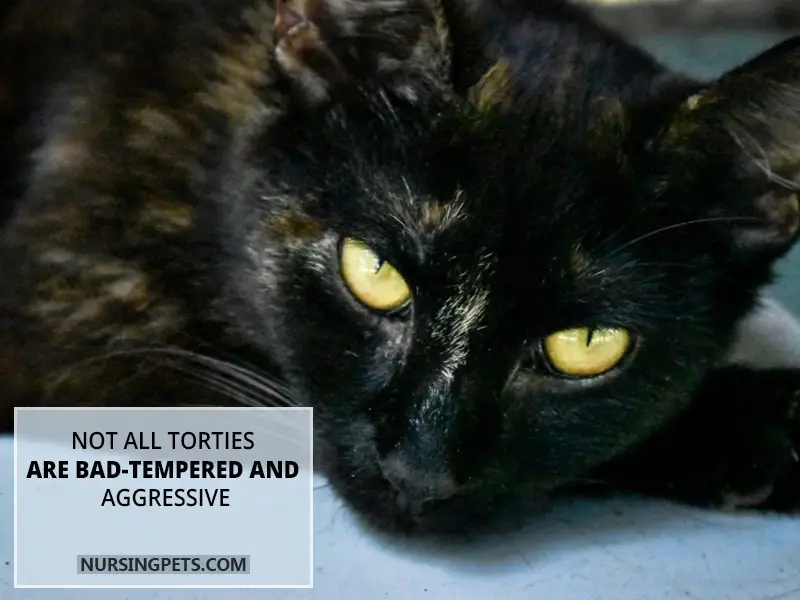
01. Identify the Reason and Remove the Cause
Cats can bite for various reasons, such as fear, attention-seeking, overstimulation, or changes at home. If you don’t maintain your cat’s routines and meet its basic needs, it may bite you.
Other signs of aggression, like hissing, swatting, or growling, are usually absent, and these “bites” happen most often when you are petting your cat.
02. Socialization and Training
Proper socialization and training are vital in preventing biting behavior. Gradually expose your cat to different people, animals, and situations, rewarding calm and non-aggressive behavior. Use positive feedback techniques, such as treats and praise, to reinforce good behavior and discourage biting.
03. Provide Plenty of Toys
Make sure your Tortoiseshell cat has a range of toys to stay entertained. Interactive toys, scratching posts, and puzzle feeders redirect their energy and focus, reducing the chances of biting due to boredom or excess energy.
Providing stimulating alternatives helps promote better behavior and a happier, healthier cat.
04. Create a Safe and Comfortable Environment
Creating a secure and comfortable environment is vital for your cat’s well-being. Offer hiding spots, elevated perches, and designated resting areas where your cat feels safe. Minimize stress by reducing stimuli.
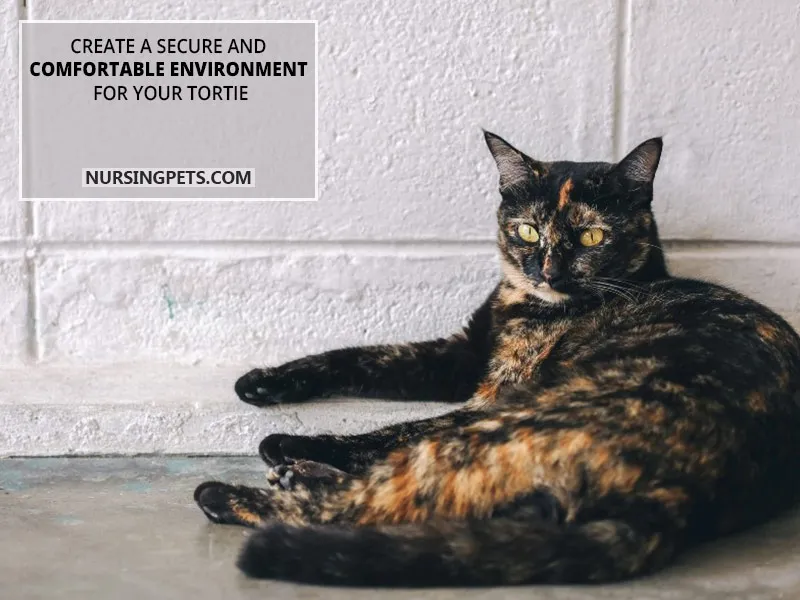
Ensure easy access to food, water, and a clean litter box. A peaceful environment promotes a contented and non-biting Tortoiseshell cat.
05. Use Positive Reinforcement Techniques
Positive reinforcement plays a crucial role in modifying your cat’s behavior. Reward good behavior with treats, petting, or playtime.
When your cat shows signs of biting, redirect her attention to a toy or interactive game. Consistency and patience are vital for reinforcing positive behaviors.
06. Try Using a Bitter Spray
You can use a bitter spray on objects or areas where your cat tends to bite as a deterrent. The unpleasant taste discourages them from engaging in such behavior. However, Read the instruction carefully before using any products to ensure they are safe for your cat.
If you’re looking for a bitter spray for your cat, check the below product from Amazon:

07. Seek Professional Help if Needed
If your Tortoiseshell cat’s biting behavior persists or worsens despite your efforts, consider seeking professional help from a veterinarian or animal behaviorist. They can assess the situation and provide expert guidance tailored to your cat’s needs.
Patience, understanding, and consistent training are crucial to prevent biting in Tortoiseshell cats. Identify the cause, offer stimulation, create a safe environment, and use positive reinforcement.
This approach helps your Tortie cat develop better behaviors, strengthening your bond.
What to Do If Your Tortie Cat Bites You?
Getting bitten by your tortie cat can be a surprising and unpleasant experience. It’s important to respond appropriately to ensure your safety and the well-being of your furry friend. Here is a step-by-step guideline on what to do if your tortie cat bites you.
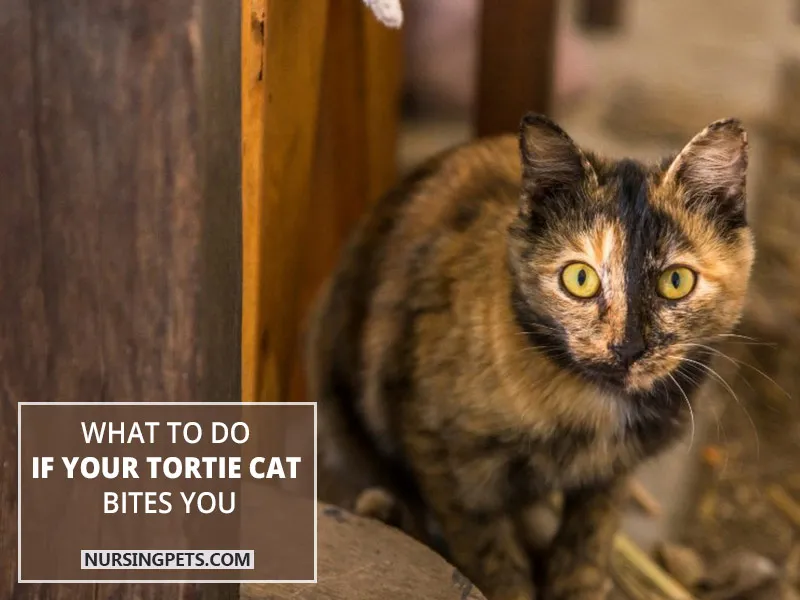
Step 1: Assess the severity of the bite
First, determine the severity of the bite. In case the bite has broken the skin or if you experience excessive bleeding, it’s considered a more severe bite. In such cases, proceed to Step 2. If the bite is minor, skip to Step 4.
Step 2: Clean the wound
For more severe bites, start by cleaning the wound immediately to reduce the risk of infection. Gently wash the affected area with soap and run with clean water, or use a disinfectant specifically formulated for wound cleansing.
Step 3: Seek medical attention if necessary
Prioritize your well-being. If the bite is deep, infected, or you have lacked a tetanus shot in the last five years, seek medical attention.
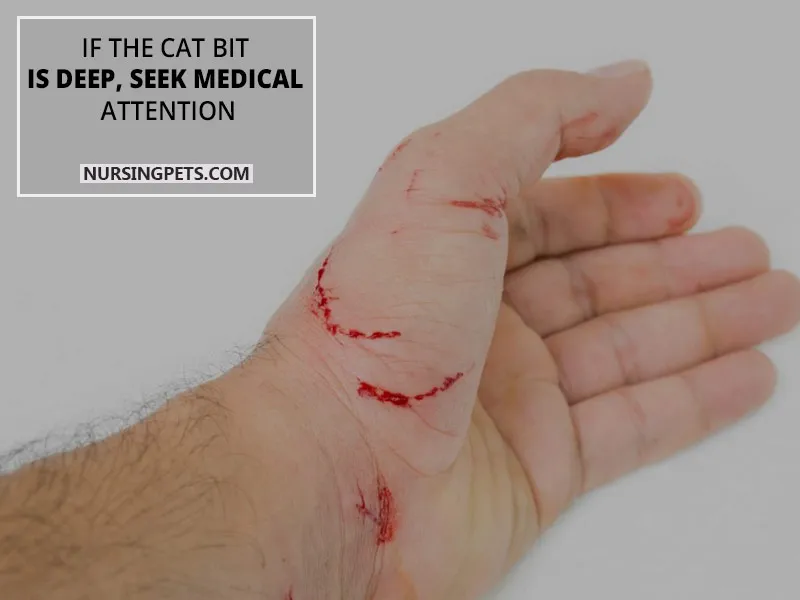
Contact your healthcare provider or visit an urgent care center for necessary treatment. Your health matters, and timely care ensures a safe and appropriate recovery.
Step 4: Observe the bite for signs of infection
Monitor the bite for any indications of infection, even in the case of minor bites. Pay attention to any redness, swelling, warmth, discharge, or increasing pain.
Recognizing these signs early on allows for prompt intervention. This will ensure your well-being and take the necessary steps for a safe recovery.
Step 5: Apply an antiseptic solution and cover it
Once the wound is cleaned, apply antibiotic ointment to prevent infection and aid healing. Moreover, covering the bite with a sterile bandage or gauze pad adds extra protection; this will prevent contamination and promote proper healing.
Step 6: Monitor your cat’s behavior
After your tortie cat bites you, closely monitor their behavior. Pay attention to any unusual signs of aggression, fear, or changes in their eating and drinking habits. These may indicate underlying issues that require attention.
Step 7: Prevent future bites
To avoid future bites, try to understand the reasons behind your cat’s behavior. Take time to comprehend why your cat may have bitten you. It could be due to fear, stress, or territorial behavior.
And take steps to create a safe and enriching environment for your cat, provide appropriate toys, and avoid rough play with your hands or feet.
So, overall, clean the wound immediately and, if necessary, seek medical assistance. Be vigilant for any signs of infection.
How To Tame/ Calm Down A Cat (Tortoiseshell)?
Tortoiseshell cats, just like any other cats, can have different personalities and temperaments. Here are some general tips that can help you calm and tame a Tortoiseshell cat:
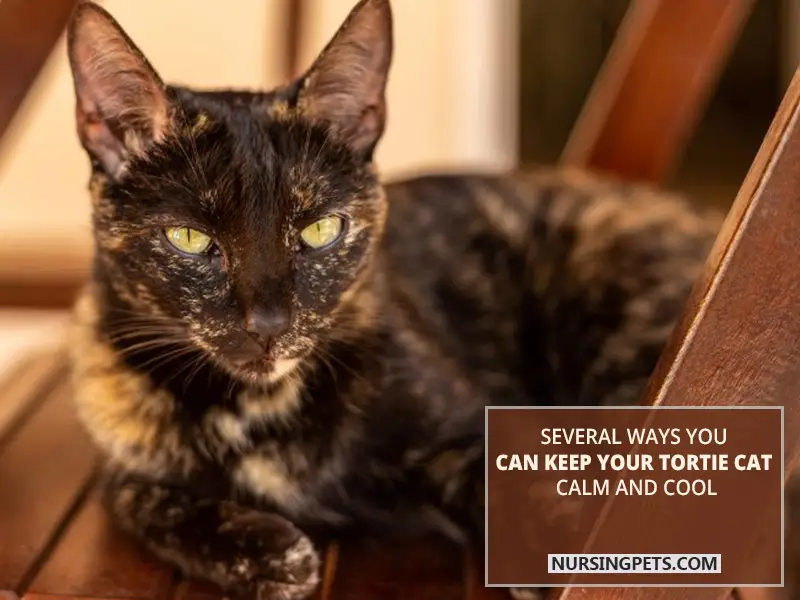
Create a safe and comfortable environment: Set up a designated area for your cat with a cozy bed, scratching post, and toys. Make sure there are hiding spots and high perches where the cat can feel secure, rest, and play.
Introduce yourself slowly: Approach the cat calmly and avoid sudden movements. Extend your hand and allow the cat to sniff you. Let them come to you at their own pace and avoid forcing interactions.
Respect their boundaries: Cats have varying comfort levels with physical contact. If your cat shows signs of discomfort like hissing, growling, or trying to escape, give them space.
And gradually increase physical contact as they become more comfortable.
Use positive reinforcement: Reward your cat with treats, praise, or playtime when they exhibit calm behavior. This helps them associate calmness with positive experiences and reinforces desired behavior.
Engage in play and exercise: Have interactive play sessions with your cat using toys like- wand toys or laser pointers. Regular playtime helps release excess energy and can promote relaxation.
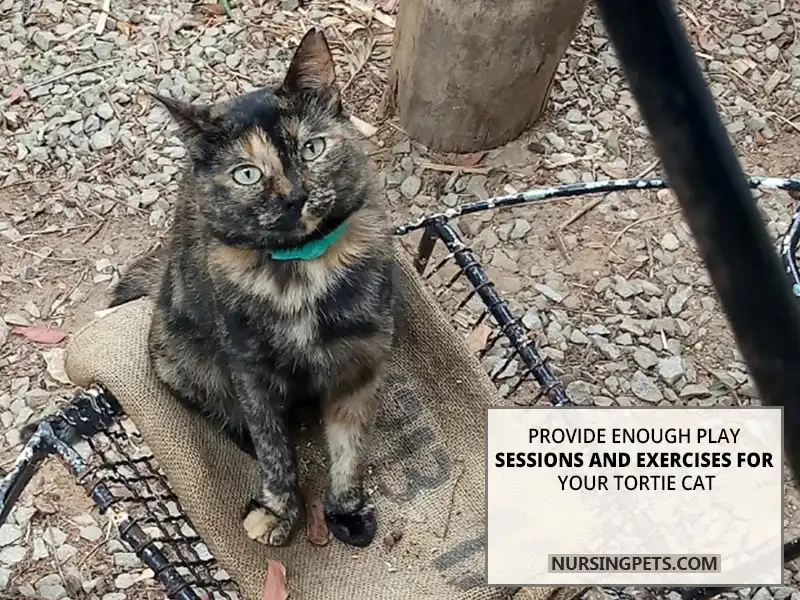
Establish a routine: Cats thrive on routine, so try to establish a consistent daily schedule for feeding, playtime, and rest. Predictability reduces anxiety and creates a sense of security for your cat.
Provide vertical space: Cats enjoy being in elevated positions as it allows them to observe their surroundings. Install cat trees or shelves at different heights to give your cat options for climbing and perching.
Consider pheromone products: Feliway (the link will take you to Amazon) is a synthetic pheromone product that can help create a calming environment for cats. It comes in diffusers (Amazon Link) or sprays and can reduce stress and anxiety.
Consult a veterinarian: If your cat’s behavior is excessively aggressive or anxious, seeking advice from a veterinarian or a professional animal behaviorist may be beneficial.
They can provide specific guidance and additional strategies based on your cat’s individual needs.
Remember, building trust and forming a bond with a cat takes time and patience. It’s best to adapt your approach based on their personality and comfort level, as they have different characteristics.
Frequently Asked Questions
1. Why Does My Tortie Cat Scratch Me?
Tortie cats may scratch you out of playfulness, communication, or seeking attention. Provide appropriate scratching posts, redirect behavior, trim nails, and engage in interactive play to minimize unwanted scratching. Each cat is unique, so observe their behavior and provide proper enrichment.
2. Why Is My Tortoiseshell Cat So Mean?
Tortoiseshell cats aren’t inherently mean, but some may display feisty behavior due to genetics, past experiences, or discomfort. Patience, positive reinforcement, and a calm environment can help improve their behavior.
3. Are Tortoiseshell Cats Cranky?
Not all tortoiseshell cats are cranky. They have sassy personalities and are quite independent. Their temperament is shaped by their individuality and experiences, not their coat color.
4. Do Tortoiseshell Cats Love Their Owners?
Of course, tortoiseshell cats can love their owners. They can form deep bonds and show affection. Providing care, attention, and a loving environment can foster a strong connection, allowing them to express their love in their unique ways.
Closing Thoughts
The unique coat pattern of tortoiseshell cats is a result of genetic factors, which may also contribute to their aggressive behavior. However, just like any other cat, torties may bite for a variety of reasons, including fear, anxiety, and dominance.
Understanding a cat’s personality and temperament is important to better prevent and address any potential biting issues. With proper care and attention, tortoiseshell cats can make wonderful pets and loving companions.
References:
- Elizabeth A. Stelow, Melissa J. Bain & Philip H. Kass (2016). The Relationship Between Coat Color and Aggressive Behaviors in the Domestic Cat. Journal of Applied Animal Welfare Science, 19:1, 1-15, doi:10.1080/10888705.2015.1081820
- https://www.palmbeachpost.com/story/lifestyle/pets/2016/02/08/cat-s-fur-color-indicator/7327823007/
- https://www.thesprucepets.com/tortoiseshell-cat-profile-554703
- https://www.preventivevet.com/cats/reasons-cats-bite
- https://www.petmd.com/cat/behavior/5-ways-calm-down-crazy-cat

